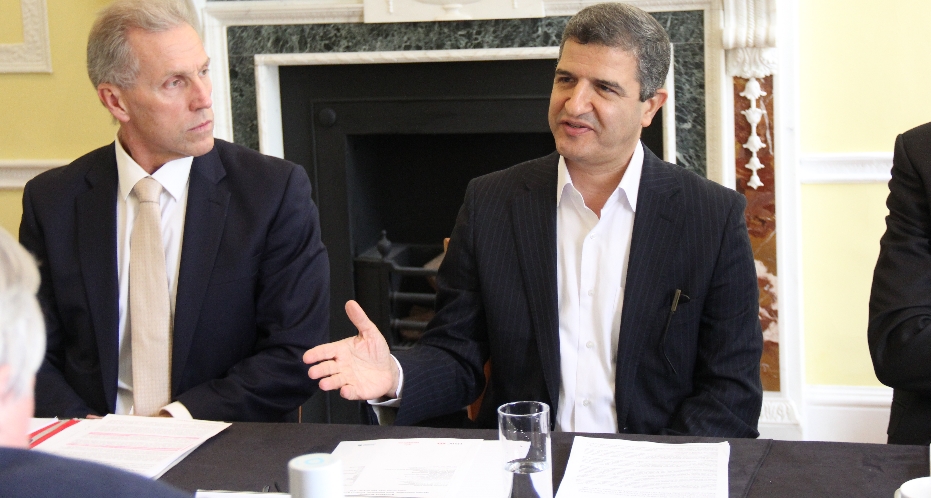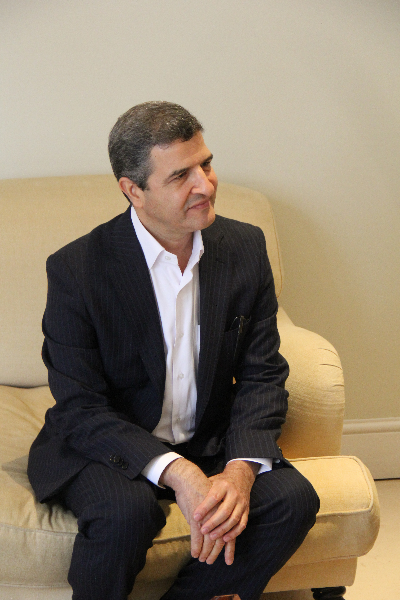Driving commercial and political engagement between Asia, the Middle East and Europe
Driving commercial and political engagement between Asia, the Middle East and Europe
Driving commercial and political engagement between Asia, the Middle East and Europe

The US is not fulfilling its obligations in the Iran nuclear deal and European banks remain reluctant to do business in Iran despite sanctions being lifted, claims Vice Governor of Banking Supervision Affairs of the Central Bank of Iran Hamid Tehranfar.
In an interview with Asia House, he said the US was not abiding by some of the terms of the Joint Comprehensive Plan of Action (JCPOA) as secondary US sanctions were still in place, which should have been lifted. He called for the US to allow the use of the dollar as not being able to clear dollars was hampering the financing of trade and the Iranian Governments access to oil revenues, not to mention its hitherto frozen assets. He also called for western authorities to do more to reassure European banks that they could do business with Iran without fear of committing any financial crime.
He said: “In my view western banks are not being cooperative. They are being very sceptical. They are not confident that things are going well with the JCPOA.”
The JCPOA, commonly known as the Iran nuclear deal, was signed in July 2015 and implemented on 16 January this year. As a result of Iran meeting its nuclear commitments, the United States, the UN Security Council and the EU agreed to lift many sanctions on Iran. The expectation was that this would give a huge boost to the Iranian economy, which had spent 10 years isolated from the global economy. But major European banks still remain reluctant to do any business connected to Iran and Iranian banks still cannot clear US dollars.
“Big western banks are waiting. They want to make sure there is no threat anymore. Some banks in the past have been fined,” Tehranfar said.
Indeed before Implementation Day, BNP Paribas was fined billions of dollars for violating economic sanctions against Iran. Other major banks were also fined for Iran sanctions violations.
European banks remain concerned about violating the complex US sanctions that remain in place. Whilst US secondary sanctions have been removed meaning that non-US banks cannot be fined by US authorities if they engage in transactions with Iran, primary US sanctions remain on US financial institutions and companies, barring them from dealing with Iranian banks engaging in any bilateral trade. This raises compliance issues for banks that follow both US and EU rules.
“None of the banks want to be the first one to make the move. They are waiting for the first one to jump,” Tehranfar continued.
“We want western banks and businesses to understand that there is no real issue to be sceptical about the Iranian banking system. We want to say to them: ‘just remove all hesitation and start relationships with Iranian banks as strong as before.’ There is nothing to be frightened of. Iranian banks all comply with global regulations.”
However, he was upbeat that in time major European banks would start to process financial transactions and finance trade with Iran.
“I think it will happen soon, in the near future,” Tehranfar said.
Tehranfar pointed out that a major drawback of the JCPOA was the ‘snapback provision’ which states that if any one party to the agreement does not comply with its obligations, sanctions can be reinstated. “Companies are worried that if they invest in Iran they might be affected by this snapback provision, and sanctions might come back in the future and then lose their money in Iran and not be able to get it out,” he said.
He said Iran hoped to address this issue at the next meeting regarding the JCPOA.“Iran is very committed to complying with everything in the JCPOA and other countries and individuals are also. You can see how committed many countries are as many have sent many delegations to Iran since Implementation Day, often headed by their presidents,” he said.
But a stumbling block that remains is the ban on the use of dollars to finance Iranian trade. Most major international trade, particularly in oil and gas, is conducted in dollars – yet Iranian banks cannot clear US dollars.
“We can’t process international money transfers easily. We have to convert into other currencies which involves costs. Trade finance is affected as cost is an important factor,” Tehranfar said.
Iran has more than US$50 billion in frozen assets in foreign banks, which it can now access thanks to the Iran nuclear deal. But “most of that is in dollars,” Tehranfar pointed out. “It is hard to find ways to make use of it. We can only bring it in for humanitarian reasons or to buy pharmaceuticals,” he added. “We can’t transfer it to Iran as it is in dollars. As far as we are concerned, secondary sanctions should be lifted and we should be going back to the 2008 year situation,” he added.
Getting oil revenues is also an issue as typically oil is paid for in dollars but currently no US banks are allowed to conduct transactions with Iran. “Most of the time we try to receive oil revenues in euros. Dollars are widely used outside US borders so I think it’s not fair to limit one country to not use them,” Tehranfar added.

Hamid Tehranfar is pictured being interviewed by Asia House Digital Editor Naomi Canton after the briefing to corporate members
“The US is not abiding by the terms of the JCPOA. At least we should not have any problems with the banking business. If we are to come back to the year 2008 then we should be easily able to make use of the dollar and it should be available to us. The US should stick with primary sanctions, not secondary sanctions, but some of the secondary ones are still in place,” he stated.
The JCPOA states that the United States should cease application of its secondary sanctions which preciously sanctioned other countries for doing business with Iran.
Tehranfar said some of his colleagues were having discussions with the US Government about this matter and he was optimistic it would get resolved.
“The governor of Iran’s Central Bank went to the USA a few weeks ago and I think after their discussion with him there will be a change in approach towards us. I am optimistic it will improve. The main thing is to give reassurance to banks that there is nothing wrong in the pipeline. This is something which can get resolved with time. We need the authorities to give the reassurances,” he said.
During his recent UK visit, the US secretary of state John Kerry did just that. He urged major European banks to help finance expanded trade to Iran. Last week a statement was issued by the EU, US, France, Germany and the UK saying they “would not stand in the way of permitted business activity with Iran.”
“John Kerry’s comments on his recent trip to the UK and this statement are signs that the authorities are finding ways to remove obstacles that are in the minds of bankers,” Tehranfar said. He thought the recent joint statement was “a very important document and very positive. I am sure that there will be change after this,” he added.
However, the statement also said there were factors “within Iran’s control” that had “hindered Iran’s economic progress.”
“For Iran to realise the economic improvement it desires, it will also have to take steps to create an environment conducive to international investment, particularly regarding the compliance with FATF recommendations,” the statement read.
But Tehranfar said that Iran did comply with the Financial Action Task Force (FATF) recommendations and was just “in dispute” about some provisions, as were many other countries. “FATF is just a dispute. You will find countries across the world in dispute over FATF,” he said.
“Iran has 80 million people. The difference with other countries is that we are in need of trade and commerce,” Tehranfar said. “We sell oil and we need to import from other countries so in order to do this we have to have considerably impressive banking relations with other countries, otherwise we can’t accomplish this natural need. We are complying with all the regulations. International standards are applicable to all internationally active banks in Iran. The Central Bank has not yet said that all our banks have to comply with Basel II and III yet but many of them are voluntarily started on the process,” he explained.
Despite the ongoing issues the banking sector is facing, Tehranfar remains extremely optimistic about prospects for Iran’s economy.
Iran’s inflation reached a peak of 45 per cent in 2013 and Iran’s GDP growth rate in 2015 was below one per cent.
The Iranian Government wants to achieve eight per cent GDP growth in 2016 and has set a target of single digit inflation this year. Tehranfar said the country was already on track to achieve both judging by the first quarter.
“As far as we know there has been enough substantial application to bring foreign direct investment (FDI) into Iran since Implementation Day. You can feel the economic boom in Iran. Everything is getting better,” he said.
He said Iran was actively seeking FDI with technology transfer.
There are lots of opportunities for European companies in Iran, especially in oil and IT, he said.
“Iranians are looking for the latest technology in these sectors,” he said. He added there were also opportunities in petrochemicals, retail, wholesale and investment banking, as well as transport infrastructure.
There are lots of opportunities in the banking sector in Iran, he said pointing out there had been interest from foreign banks. “In free trade zones 100 per cent ownership is possible, otherwise it is 40 per cent. Some senior officers of some foreign banks have shown interest. I think there will be a decision soon – it just needs some preparation,” he said.
“We are in dire need of FDI so there are lots of opportunities for foreign companies. We have unemployment of more than 12 per cent so we need to create jobs for the young,” he said, explaining Iran had no aspirations to invest outside Iran currently.
As for low oil prices, he said: “Iran is willing to increase the oil price. The problem is fluctuations in the market and the seasons. Iran wants to respect international regulations and have peace and so prices have gone down.”
“Maybe the previous government had a different approach,” he said. “The new administration has got a specific approach and I think this is unique to this government. The previous administration had its own objectives. There will always be a struggle in these two approaches, every administration thinks it is the best. The recent election shows that most Iranians are in favour of the prevailing government,” he added, referring to Iranian president Hassan Rouhani. “The new parliament is also most in favour of it. It’s a moderate government; they don’t want to be hardliners,” he added.
naomi.canton@asiahouse.co.uk
To read an interview that Asia House conducted with the Vice Governor of Economic Affairs of the Central Bank of Iran Peyman Ghorbani click here. In that interview he talks about the opportunities in Iran for foreign companies and the hesitation of western banks following the lifting of sanctions.
For Asia 2025, an Asia House publication launched on March 8, Vahid Alaghband, Chairman of Balli Holdings Limited, wrote a piece titled Iran: lifting sanctions is only the first step on a long journey to recovery. To read the full piece please click here.
